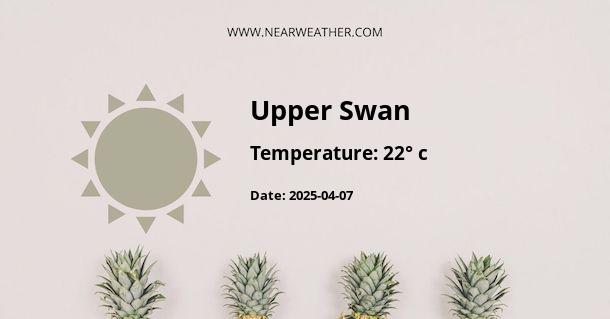Weather
22° 
Climate Conditions: clear sky
Humidity: 65%
Wind speed: 7.42 km/h
Wind direction: 360°
Daily Weather Forecast
Monday
04/07/2025
Climate Conditions: scattered clouds
Humidity: 61%
Tuesday
04/08/2025
Climate Conditions: clear sky
Humidity: 91%
Wednesday
04/09/2025
Climate Conditions: scattered clouds
Humidity: 87%
Thursday
04/10/2025
Climate Conditions: clear sky
Humidity: 70%
Friday
04/11/2025
Climate Conditions: overcast clouds
Humidity: 41%
Evolution
Daily Weather Forecast Evolution (°C)
Lowest temperature
Highest temperature
Other Information
Sunrise
06:30
Sunset
18:04
Latitude
-31.766670
Longitude
116.016670
Timezone: GMT+05:30
More about Upper Swan:
Climate and Weather in Upper Swan, Australia
Upper Swan is a picturesque suburb located in the Swan Valley region of Western Australia, just 34 kilometers northeast of Perth. The region is known for its stunning landscapes, vineyards, and a wide range of outdoor activities. Understanding the climate and weather patterns in Upper Swan is essential for residents and visitors alike to plan their activities and make the most of their time in this beautiful location.Climate Overview
Upper Swan experiences a Mediterranean climate, characterized by hot, dry summers and mild, wet winters. The region enjoys long hours of sunshine, making it an ideal destination for outdoor enthusiasts. The climate is influenced by its proximity to the Indian Ocean and the Swan River, which moderates the temperature and provides a cooling effect.Temperature
The summer months in Upper Swan, which typically span from December to February, are hot and dry, with average maximum temperatures ranging from 30 to 35 degrees Celsius (86 to 95 degrees Fahrenheit). The highest recorded temperature in Upper Swan was 44.2 degrees Celsius (111.6 degrees Fahrenheit) in January 2007. It is important to stay hydrated and seek shade during the hottest parts of the day. Winters in Upper Swan, from June to August, are mild and wet, with average maximum temperatures ranging from 16 to 19 degrees Celsius (61 to 66 degrees Fahrenheit). The region rarely experiences frost or snowfall, making it a favorable destination for those seeking a milder winter climate.Rainfall
Upper Swan experiences most of its rainfall during the winter months, with June being the wettest month. The average annual rainfall in the region is around 800 millimeters (31 inches), ensuring the lush greenery and vibrant vineyards that the Swan Valley is famous for. It is advisable to pack a raincoat or umbrella when visiting during the winter months to be prepared for occasional showers.Wind
Upper Swan is not particularly known for strong winds compared to some coastal regions in Western Australia. However, during the summer months, the region can experience occasional breezes, providing some relief from the heat. It is worth noting that the wind can increase the risk of bushfires during dry periods, and visitors should follow any fire safety guidelines and warnings.Climate Charts
To visually represent the climate patterns in Upper Swan, the following tables and charts provide detailed information about the average monthly temperature and rainfall throughout the year.Upper Swan Average Monthly Temperature
| Month | Max Temperature (°C) | Min Temperature (°C) |
|---|---|---|
| January | 32 | 18 |
| February | 32 | 18 |
| March | 30 | 16 |
| April | 26 | 13 |
| May | 22 | 9 |
| June | 18 | 7 |
| July | 17 | 6 |
| August | 18 | 7 |
| September | 20 | 9 |
| October | 24 | 11 |
| November | 28 | 14 |
| December | 31 | 17 |
Upper Swan Average Monthly Rainfall
| Month | Rainfall (mm) |
|---|---|
| January | 7 |
| February | 9 |
| March | 13 |
| April | 32 |
| May | 97 |
| June | 135 |
| July | 139 |
| August | 99 |
| September | 59 |
| October | 36 |
| November | 19 |
| December | 11 |
Best Time to Visit
The best time to visit Upper Swan depends on personal preferences and the type of activities you plan to engage in. The summer months, from December to February, offer long days and plenty of sunshine, making it ideal for outdoor activities such as vineyard tours, picnics, and exploring the beautiful Swan Valley. If you prefer milder temperatures and want to witness the lush greenery, visiting in spring (September to November) or autumn (March to May) is recommended. During these seasons, the weather is pleasant, and the vineyards are in full bloom, creating a picturesque setting for wine tasting and enjoying the local produce.Conclusion
Upper Swan, Australia, experiences a Mediterranean climate with hot, dry summers and mild, wet winters. The region is characterized by long hours of sunshine, making it a favorable destination for outdoor activities. The average annual rainfall ensures the lush greenery and vibrant vineyards that the Swan Valley is famous for. Whether you visit in summer or prefer the milder temperatures of spring and autumn, Upper Swan offers a beautiful setting for exploration, wine tasting, and enjoying the natural beauty of the Swan Valley region.FAQ's about Upper Swan's Weather:
Q - What is the Latitude and Longitude of Upper Swan?
A - Upper Swan's Latitude is -31.766670 & Longitude is 116.016670.
Q - What is the weather in Upper Swan today?
A - Weather in Upper Swan is 22° today.
Q - What is the climatic condition of Upper Swan today?
A - Climate Conditions in Upper Swan shows clear sky today.
Q - What is the humidity in Upper Swan today?
A - Humidity in Upper Swan is 65% today.
Q - What is the wind speed in Upper Swan today?
A - Wind speed in Upper Swan is 7.42 km/h, flowing at 360° wind direction. today.

Nearby Locations
Latest searched locations